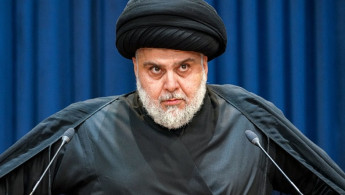Muqtada al-Sadr demands US embassy in Baghdad closure due to Israel's genocide in Gaza
On Tuesday, Iraq's influential Shia cleric Muqtada al-Sadr called for the expulsion of the United States Ambassador to Iraq, Alina L. Romanowski, and the closure of the US embassy in Baghdad’s fortified Green Zone. This demand comes in protest of Washington's support for Israel amid the ongoing bloodbath against Palestinians in Gaza.
"I reiterate my demand for the expulsion of the U.S. ambassador through established diplomatic channels," al-Sadr, who is leading the National Shia Movement, stated in a post on the X platform. "This peaceful approach, without bloodshed, would demonstrate our civility in the face of their aggression and arrogance. It would be a more effective deterrent than force, which could give them a pretext to destabilise Iraq."
In a televised speech on Wednesday, Sadr denounced Israel’s defying an appeal from the International Court of Justice (ICJ) to halt its massacres in Rafah, and the international community's silence on what Israel’s disrespecting the decisions by the tribunal.
He also rebuked "the US's fake democracy and freedom" and accused the US of pursuing a hypocritical policy, turned blinded-eyed of the Israeli atrocities against the innocent civilians of Gaza.
Sadr, who once headed a militia that fought US forces following the 2003 US-led invasion that toppled dictator Saddam Hussein, continues to maintain a loyal following of millions within Iraq's majority Shia Muslim population. His influence remains significant in Iraqi politics, and his recent actions suggest he is gearing up his populist electoral machine for a return to power in the country's parliamentary elections scheduled for late 2025.
This is not the first time Sadr has called for the closure of the US embassy in Baghdad. On 27 October 2023, he made a similar demand to show support for the Palestinian people in Gaza facing genocide by the Israeli army. Sadr condemned the Zionist regime for committing atrocities against Gaza's residents, asserting that the US is supporting those actions.
In his recent post, Sadr emphasised that according to all heavenly religions, it is forbidden to refer to the Zionist regime as Israel, the name of God's messenger to the Jews. He also called on the Organisation of Islamic Cooperation and the Arab League to take a more active role in stopping the "massacres and violations" against Palestinians in Gaza, adding, "Enough of silence."
On the morning of 7 October 2023, Hamas led a multifaceted surprise attack, resulting in the deaths of approximately 1,150 Israelis, including both soldiers and civilians. The attack also wounded hundreds and led to around 200 individuals being captured and taken to Gaza to negotiate for the release of thousands of Palestinians held by Israel.
Israel's offensives devastated the Gaza Strip and killed at least 36,096 people, mostly women and children, according to the Palestinian health ministry. The death toll is likely to be much higher because thousands of victims remain trapped under rubble.
Sadr's political manoeuvres have a significant history. In the early elections held on October 10, 2021, Sadr's bloc emerged victorious, securing 73 seats. He pledged to establish a "national majority" government in collaboration with several Sunni and Kurdish blocs, indicating disagreements with other Shia factions aligned with Iran. However, unable to fulfil this promise, Sadr instructed lawmakers from his bloc to resign, which they did on 12 June 2022. This led to violent clashes in Iraq's capital between militias loyal to Sadr and Iran-backed factions, turning Baghdad into a battleground.
Sadr's ongoing influence and recent demands highlight the volatile nature of Iraqi politics and the potential for future unrest as the country approaches its next parliamentary elections.





 Follow the Middle East's top stories in English at The New Arab on Google News
Follow the Middle East's top stories in English at The New Arab on Google News


